
3
HNUE JOURNAL OF SCIENCE
Social Sciences 2024, Volume 69, Issue 4, pp. 3-9
This paper is available online at https://hnuejs.edu.vn/
DOI: 10.18173/2354-1067.2024-0062
COLONIAL MASCULINITY IN GOING AFTER CACCIATO BY TIM O'BRIEN
Bui Linh Hue* and Nguyen Dieu Linh
Faculty of Languages & Culture, Thai Nguyen University of Sciences,
Thai Nguyen province, Vietnam
*Corresponding author Bui Linh Hue, e-mail: huebl@tnus.edu.vn
Received November 5, 2024. Revised November 22, 2024. Accepted November 23, 2024.
Abstract. There have been several feminist research depicting Tim O’Brien’s fiction as
discourses of masculinity, but none mention how the writer interprets the relationship
between gender and race in these texts. This article sees one of O’Brien’s most important
fictions, Going After Cacciato (1978), an anti-war novel, as his project to de-gender the
American colonial masculinity perspectives on the war. The novel is set during the war in
Vietnam. It is told from the point of view of an American soldier, Paul Berlin. Cacciato, one
of Berlin's squadmates, goes absent without leave to walk from Vietnam to Paris. The novel
describes Berlin's imagined chase of Cacciato across Eurasia. Berlin’s two worlds, real and
unreal, match each other in the way he looks at Asian women in particular, and Asian world
in general because they are both reflect the colonial masculine perspective.
Keywords: Going After Cacciato, Tim O’Brien, colonial masculinity, postcolonialism.
1. Introduction
The depiction of women in war fiction is often intertwined with the concept of masculinity.
One of the reasons is that war is traditionally considered a predominantly male-coded domain.
There has been several research on the issue of gender in Tim O’Brien’s fiction. Pamela Smiley
argued that in The Things They Carried, O'Brien accomplishes through a series of female
characters through whom he de-genders war, constructs an ideal (female) reader, and redefines
American masculinity [1]. Lorrie Smith revealed that in The Things, O'Brien writes women out
of the war and the female reader out of the storytelling circle [2]. And Lisa Dawn Ferguson,
through a comparative study between Tim O'Brien's Going After Cacciato, James Webb's Fields
of Fire, and Stephen Wright's Meditation in Green, showed that in these novels, Asian and
American women in all of these works, "good" or "bad," are ultimately figures of exchange, used
to bind distraught soldiers together and highlight their unique connections [3]. These feminist
researches all depicted O’Brien’s fiction as discourses of masculinity, but none mentioned the
relationship between gender and race in these texts. This article examines one of O’Brien’s most
important fiction, Going After Cacciato, as his project to de-gender the colonial masculinization
perspective of a young American soldier towards the war in Vietnam.
The idea that wars are masculine and texts written by war veterans work closely with
masculinization is not new. Susan Jeffords in her book The Masculinization of America: Gender
and the Vietnam War asserts that “the Vietnam War in particular are not just fields of battle but
field of gender … more than this, the representational features of the Vietnam War are structurally

Bui LH* & Nguyen DL
4
written through relations of gender, relations designed primarily to reinforce the interests of
masculinity and patriarchy” [4; xi].
After the Vietnam War, the way writers write about the war has changed a lot. Published in
1978, Going After Cacciato is different from early fiction and nonfiction on the Vietnam War.
This National Book Award-winning book is a complicated post-modern text. Told from the
perspective of squad member Paul Berlin, the search for Cacciato, an American soldier
who deserts his post in Vietnam, soon enters the realm of the surreal as the men find themselves
following an elusive trail of chocolate M&M's through the jungles of Indochina, across India,
Iran, Greece, and Yugoslavia to the streets of Paris. It is a fiction about fiction, a text about
possibilities and imagination. Most Asian characters, especially Asian women in the novel are
created by Paul Berlin’s imagination. In Going After Cacciato, Tim O’Brien wrote: “What you
remember is determined by what you see, and what you see depends on what you remember” [5;
111], and for Paul Berlin, the journey “going after Cacciato” is: “not exactly daydreams, not
exactly fantasies. Just a way of working out of possibilities” [5; 122].
This means there is no boundary between Paul Berlin the soldier at the observation post and
Paul Berlin in the imaginative journey to Paris. Berlin’s two worlds, real and unreal, match each
other in the way he looks at Asian women in particular, and Asian world in general because they
are both reflected by a colonial masculine perspective. The American colonial masculinity in the
protagonist, Paul Berlin, can be traced to the Asian female characters who are Sarkin Aung Wan’s
aunts, Sarkin Aung Wan, and Jolly Chand, and the Asian men, as well as the land (Quang Ngai
in particular, and Vietnam in general).
2. Content
2.1. Paul Berlin’s imagination of Asian women
Suddenly on the road to Paris of Paul Berlin’s squad after Stink killed their beloved water
buffalo, Sarkin Aung Wan’s two aunts are depicted as simple-minded, monotonous, and weird.
Not only are their fates similar to each other (lost children, properties, and became refugees) but
their expressions in the novel are also all the same: they were moaning, bawling, howling, or
wailing for their lost buffalo.
“Three women sat there. The two old women were bawling…”
“All the women are bawling now. Madhouse sounds. The bawling flickered in and out,
sometimes very high, other times seeming to tremble and fade.”
“As if on signal, the two old women began howling, their noses at the moon” [5; 31].
That monotonous expression of the two women continues to be repeated many times in the
next two pages of the novel:
“Later they ate dried fish and rice. It was a warm, sweet night. Crickets, a breeze the velvet
sky. For a time the two old aunties moaned for their lost Nguyen, sobbing, rocking miserably on
their haunches. Then they slept” [5; 33].
“At night, after the fire died, the girl’s two aunts would wail for their lost Nguyen. Rocking,
their leathery old faces pointed to the sky, they would start with low moans like an animal’s
breathing. An hour, perhaps two hours, and the moans would become sobs, and the sobs would
go mournful and high, and in the deepest part of the night the sobbing would become wailing.
They could not be consoled. Dark and tiny and wrinkled, swaying on their haunches, the old
women would howl the night long. And in the morning, without speaking, they would climb
aboard the overloaded oxcart and take their positions at the rear, facing backward, squatting
silently with their eyes always east” [5; 34].
And, although the two aunts and their niece Sarkin Aung Wan all appear in the novel at the
same time and join the journey, their roles end very early: they suddenly disappear when the group

Colonial masculinity in Going After Cacciato by Tim O'brien
5
falls down a maze under the ground. They were lost forever and no one in the group cared or
mentioned their disappearance. This is the logic of imagination or a dream because all of them
are from Paul Berlin’s imagination. But these characters initially reveal how American soldier
Pau Berlin looks at Asian women.
Sarkin Aung Wan may be considered the most important female character in the novel. After
joining the soldiers’ journey, she became Pau Berlin’s intimate friend and nearly his lover. At
first sight, her looks and behaviors were all Vietnamese women’s:
“Three women sat there. The two old women were bawling. The other was a girl. A girl, not
a women maybe twelve, maybe twenty-one. Her hair and eyes were black. She wore an ao dai
and sandals and gold hoops through her ears. Hanging from a chain about her neck was a chrome
cross” [5; 31].
“Paul Berlin watched: smooth skin, dignity, eyes that were shy and bold, coarse black hair.
She was young, though. Much too young. She smelled of soap and joss sticks. The gold hoop
earrings sparkled” [5; 32].
“He watched as she spread out her blanket, removed her sandals, brushed her hair, stretched,
yawned, lay back. He liked this. He liked it when she smiled at him, nodding slightly, smoothing
her ropes about her legs” [5; 33].
Sarkin Aung Wan was not only beautiful, and sweet but also very lively. After having
acknowledged that the soldier squad was going to Paris, she immediately requested to join them
because Paris was her dream place. She kept saying to Berlin about Paris and what she would do
in Paris. She tried her best to persuade Berlin and the lieutenant to let her join them: “… she
showed him her many strengths… She lifted the robe. Her legs were brown and smooth and
muscled. The skin was tight without lines or wrinkles” [5; 35].
Different to Phuong, a Vietnamese girl in The Quiet American (Graham Green, 1955), who
is passive and never able to show her emotions, Sarkin Aung Wan is intelligent and articulate.
She was the only one who found the way out of the maze under the ground, freeing the group.
This very young girl understood that “The way in is the way out” and she wisely led the soldiers
out of it: “The heat again. Then cold. But Sarkin Aung Wan led them on with the sureness that
comes of knowledge” [5; 55].
Imaginary Sarkin Aung Wan is beautiful, pure, wise, and kind-hearted. At first sight, readers
may think that Sarkin is purely and homogenously created. Some of her features are not
Vietnamese/Asian at all. In the time of Sarkin (before 1975), Vietnamese girls raised in traditional
families were often shy when communicating with strangers, especially men. However, Sarkin
was not only fluent in English but also easy to get on with the strange soldiers and soon fell in
love with Berlin: “Together we shall see Paris. Stroll through the gardens, visit all the famous
monuments. Perhaps we shall fall in love there. Is that possible?” [5; 34].
The way Sarkin was dancing with Paul Berlin in a pub in Tehran reminded him of his crush
at school:
“Paul Berlin took Sarkin Aung Wan and led her to the floor. Unreal, he thought. Just a
creature of his making – blink and she was gone – but even so, he liked the way she closed her
eyes to the music, the way her chrome cross bounced on her sweater, her braided hair swishing
so full. She smiled when she danced. He liked that, too. It was the way Louise Wiertsma had once
smiled, guarding secrets” [5; 110].
In some way, Sarkin is the image created by Berlin’s nostalgia. She reminds Paul Berlin of
the lively school girl with a strong personality, who likes creams and nail painting, Louise
Wiertsma, for example. But in another way, Sarkin also reminds us of tender and ignorant women
who live under the strict patriarchal society: she licked Berlin’s wounds, cut Berlin’s nails, kept
asking naïve questions about politics and Paris, and hoped that Berlin would buy something pretty

Bui LH* & Nguyen DL
6
in Paris. Then, Sarkin is Paul’s fantasy of an idealist woman: both the characteristics of Western
women and of Asian ones, who obey.
Yet Sarkin is not the only verbal Asian woman in Going After Cacciato. Paul Berlin and his
comrades travel from Vietnam to Burma, Bangladesh, Iran, India, Greece, and Paris. In India, the
group meets an Indian woman named Jolly Chand. Unlike Sarkin, Jolly is described as all-
American in and out.
“She was behind the registration desk, riding an Exer-Bike. Dressed in blue jeans and a gauze
muslin blouse, the woman instantly reminded Paul Berlin of his mother. It was an immediate
thing, a total presence. Eyebrows plucked and repainted, bright carmine lipstick, streaks of auburn
deftly folded into black hair.
‘American!’ she cried.
… She was breathless. ‘American!’ she kept saying” [5; 80].
The reasons that Jolly is so enthusiastic about American life are: “(She) spent two years in
Baltimore, studying hostelry under a scholarship at John Hopkins. The loveliest period of her
entire life, she said. Memories of sailing ships, department stores, and shopping malls… American
rang in her head like the golden bells of Masjid-i-Sulaiman” [5; 80]. Two years in America
completely changed Jolly Chand from an Indian woman to an American-idolized one. She kept
imagining America as “a land of genius and invention… only Americans could so skillfully build
instant bridges among classes, bind together diversity” [5; 80]. Her love for American civilization
resulted in a return from America “with forty-five bottles” of Hunt’s ketchup and a love affair
with the American lieutenant.
Like Sarkin, Jolly Chand’s appearance and behaviors are not Asian at all. Contrary to Indian
culture, she was the host at the dinner, instead of her husband. She wore Western-styled clothes,
was open-minded, and skillfully controlled the talk at the dinner table.
“It was a long, extravagant meal, and Jolly Chand was charming. Over chilled herring, she
questioned Doc about the future of socialized medicine, listening attentively as he discussed
health-delivery systems and doctor-patient ratios. Over soup and salad, she complimented Oscar
on his sunglasses and new hat, demanded to see snapshots of Stink’s four sisters….” [5; 81].
Jolly Chand reminds Paul Berlin of his mother; for the old lieutenant, she was “one classy
woman”, “brave”, “impure”, “tainted” [5; 80]. Her American look and characteristics, her denial
of Indian culture and her husband, and her desire for American civilization and man again reveal
Berlin’s colonial masculinity perspective on Asian people and culture. Asian female characters,
Sarkin and Jolly, become the erotic fantasies of American soldiers not by their exotic and
‘Eastern’ characteristics but by their ‘Western’ ones.
2.2. Paul Berlin’s imagination of Asian men
Berlin’s colonial masculinity can be also traced to his imagination of Asian men in the novel.
The first-appeared Asian man in the novel was Li Van Hgoc, a Vietcong soldier who fled from
the war and was imprisoned in a maze under the ground. Ruined by a war he never cared about,
he lived “an earthworm’s existence” for ten years, weeping, and did not desire to escape the maze
because he believed he could never find the way out.
The Indian man, Jolly Chand’s husband, is another powerless Asian man: “Only once, during
dessert, did the woman’s husband reappear. He dressed in white, head wrapped in a turban,
leggings to his knees. He stood quietly for a moment. Then without a word he turned and vanished
through the gauze curtain” [5; 81]. In a strict patriarchal society like India, it was unusual for the
owner of a hotel like Jolly’s husband to behave such cowardly when he saw his wife had an affair
with an American man in front of him. All of his reactions against his wife’s desires for
the American lifestyle and man were just complaints and silence: “My husband accused me to be

Colonial masculinity in Going After Cacciato by Tim O'brien
7
corrupted by hamburgers and French fries and Winston One Hundreds” [5; 80]. When he is with
the American soldiers, a passive silence also takes over:
“Neither the lieutenant and Jolly Chand came down for breakfast the next morning. It was
all a little embarrassing. Sullen and tired-looking, the woman’s husband served tea and bread in
the small dining area overlooking the garden. He did not look up. He poured the tea, waited a
moment, then slipped away” [5; 82].
Jolly’s husband is not mute. But in the presence of the Americans, he remains non-verbal,
even when he knows that his wife is having an affair with one of them. He continues to work as
a servant.
The non-verbal Asian female and male figures (Sarkin’s aunts and Jolly’s husband) become
more understandable if seen in the light of Edward Said’s description of Orientalism:
“The two aspects of the Orient that set it off from the West in this pair of plays will remain
essential motifs of European imaginative geography. A line is drawn between two continents.
Europe is powerful and articulate; Asia is defeated and distant. Aeschylus represents Asia, makes
her speak in the person of the aged Persian queen, Xerxes’ mother. It is Europe that articulates
the Orient; this articulation is the prerogative, not of a puppet master, but of a genuine creator,
whose life-giving power represents, animates, constitutes the otherwise silent and dangerous
space beyond familiar boundaries” [6; 57].
Under Said’s points, Asian characters in Going After Cacciato are not too different from
Eastern ones in Aeschylus’s The Persians and Euripides’s The Bacchae. The Asian men, Jolly
Chand’s husband, for example, in Pau Berlin’s daydream, are feminized, or inferior both in terms
of sex and power to their women and the white people.
2.3. Paul Berlin’s thoughts on the land
The colonial masculinity perspectives on Asian/Vietnamese women and men are
mixed/transferred into the way of looking at the land: Quang Ngai, in particular, and Nam
(Vietnam, as Berlin and his comrades calls it), in general.
“Whenever he thought of the land, he thought first of the paddies. But next, almost in the
same thought, he thought of the hedgerows. They were thick, unclipped, untended tangles… the
hedgerows expressed the land’s secret qualities: cut up, twisting, covert, chopped and mangled,
blind corners leading to dead ends, short horizons always changing. It was a feeling. A feeling or
marching through a great maze…” [5; 136].
“He had seen, before seeing, hideous skin diseases, hunger, rotting animals, huts without
furniture or plumbing or light. He had seen the shit-fields where villagers squatted. He had seen
chickens roosting on babies. Misery and want, bloated bellies, scabs and pus-wounds, even death”
[5; 136].
Paul Berlin felt alone and alien to the land which is full of secret hedgerows, cruel diseases,
poverty and deaths, and blank-eyed people. After having escaped from the land, Berlin thought
of the first city he met, which is Mandalay, as the land of civilization:
“The streets widened… The street became a boulevard. Fountains spraying colored water.
Children romping on trimmed grass, old men on park benches and lovers hand in hand, women
pushing baby carriages, people lingering, people chatting and laughing, bikes and Hondas and
carts and buses and donkeys, date trees in neat rows, hedges trimmed and cut square.
‘Civilization,’ Paul Berlin said” [5; 62].
It is noticeable that this Asian city was a colonial land of the British. The name ‘Mandalay’
is popular to American soldiers because it is in Frank Sinatra’s famous song On the Road to
Mandalay (1958) based on Kipling’s poem Mandalay (1892). The poem is Kipling’s fantasy of




![Đối diện Trung Hoa: Diễn ngôn giải định kiến trung tâm ngoại biên của người Việt thời tiền hiện đại [Phân tích]](https://cdn.tailieu.vn/images/document/thumbnail/2025/20250328/viuzumaki/135x160/9021743168094.jpg)
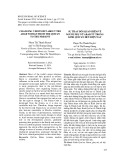
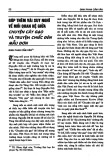
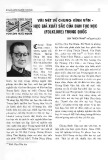
![Các kiểu cấu trúc truyện và ý nghĩa ngụ ngôn [chuẩn SEO]](https://cdn.tailieu.vn/images/document/thumbnail/2025/20250109/nienniennhuy77/135x160/8381736392221.jpg)
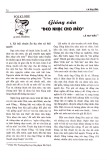


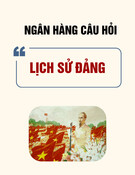







![Giáo trình Tổ chức và Quản lý Hoạt động Văn hóa Thông tin Cơ sở (Ngành Quản lý Văn hóa - Trung cấp) - Trường Trung cấp Mỹ thuật - Văn hóa Bình Dương [Mới nhất]](https://cdn.tailieu.vn/images/document/thumbnail/2025/20251110/kimphuong1001/135x160/17861762748492.jpg)





